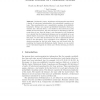Free Online Productivity Tools
i2Speak
i2Symbol
i2OCR
iTex2Img
iWeb2Print
iWeb2Shot
i2Type
iPdf2Split
iPdf2Merge
i2Bopomofo
i2Arabic
i2Style
i2Image
i2PDF
iLatex2Rtf
Sci2ools
108
Voted
FOSSACS
2007
Springer
2007
Springer
Approximating a Behavioural Pseudometric Without Discount for Probabilistic Systems
Desharnais, Gupta, Jagadeesan and Panangaden introduced a family of behavioural pseudometrics for probabilistic transition systems. These pseudometrics are a quantitative analogue of probabilistic bisimilarity. Distance zero captures probabilistic bisimilarity. Each pseudometric has a discount factor, a real number in the interval (0, 1]. The smaller the discount factor, the more the future is discounted. If the discount factor is one, then the future is not discounted at all. Desharnais et al. showed that the behavioural distances can be calculated up to any desired degree of accuracy if the discount factor is smaller than one. In this paper, we show that the distances can also be approximated if the future is not discounted. A key ingredient of our algorithm is Tarski’s decision procedure for the first order theory over real closed fields. By exploiting the Kantorovich-Rubinstein duality theorem we can restrict to the existential fragment for which more efficient decision procedu...
Applied Computing | Discount Factor | FOSSACS 2007 | Probabilistic Bisimilarity | Probabilistic Transition Systems |
| Added | 07 Jun 2010 |
| Updated | 07 Jun 2010 |
| Type | Conference |
| Year | 2007 |
| Where | FOSSACS |
| Authors | Franck van Breugel, Babita Sharma, James Worrell |
Comments (0)

